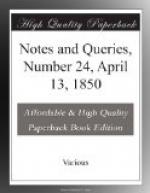W.R.F.
Laerig.—Without contraverting Mr. Singer’s learned and interesting paper on this word (No. 19. p. 292.), I hope I shall not be thought presumptuous in remarking that there must have been some other root in the Teutonic language for the two following nouns, leer (Dutch) and lear (Flemish), which both signify leather (lorum, Lat.), and their diminutives or derivatives leer-ig and lear-ig, both used in the sense of tough.
Supposing the Ang.-Sax. “laerig” to be derived from the same root, it would denote in “ofer linde laerig,” the leather covering of the shields, or their capability to resist a blow.
I will thank you to correct two misprints in my last communication, p. 299.; pisan for pison, and [Greek: ’Ioannaes [o=omicron]] for [Greek: ’Ioannaes [o=omega]].
By the by, the word “pison” is oddly suggestive of a covering for the breast (pys, Nor. Fr.). See Foulques Fitzwarin, &c.
B.W.
March 16th.
Laerig (No. 19. p. 292.).—The able elucidation given by Mr. Singer of the meaning of this word, renders, perhaps, any futher communication on the point unnecessary. Still I send the following notes in case they should be deemed worthy of notice.
“Ler, leer—vacuus. Berini Fabulae, v. 1219. A.-S. ge-laer.”
Junii Etymol. Anglicanum.
“Lar, laer—vacuus.”
Schilteri Glossarium Teutonicum.
Respecting “Lind,” I find in the version by Thorkelin of De Danorum Rebus Gestis Poema Danicum Dialecto Anglo-Saxonica (Havniae, 1815), that “Lind haebbendra” is rendered “Vesilla habens;” but then, on the other hand, in Biorn Haldorsen’s Islandske Lexicon (Havniae, 1814), “Lind” (v. ii. p. 33) is translated “Scutum tiligneum.”
C.I.R.
Vox et praeterea nihil (No. 16. p. 247.).—The allusion to this proverb, quoted as if from the Anatomy of Melancholy, by “C.W.G.” (No. 16. p. 247.), may be found in Addison’s Spectator, No. 61, where it is as follows:—
“In short, one may say
of the pun as the countryman described
his nightingale—that
it is ‘vox et praeterea nihil.’”
The origin of the proverb is still a desideratum.
Nathan.
Vox et praeterea nihil (No. 16. p 247.).—In a work entitled Proverbiorum et Sententiarum Persicarum Centuria, a Levino Warnero, published at Amsterdam, 1644, the XCVII. proverb, which is given in the Persian character, is thus rendered in Latin,—
“Tympanum magnum edit clangorem, sed intus vacuum est.”
And the note upon it is as follows:—
“Dicitur de iis, qui
pleno ore vanas suas laudes ebuccinant.
Eleganter Lacon quidam de
luscinia dixit,—
[Greek: Ph_ona tu tis essi kai ouden
allo,]
Vox tu quidem es et aliud nihil.”
This must be the phrase quoted by Burton.




